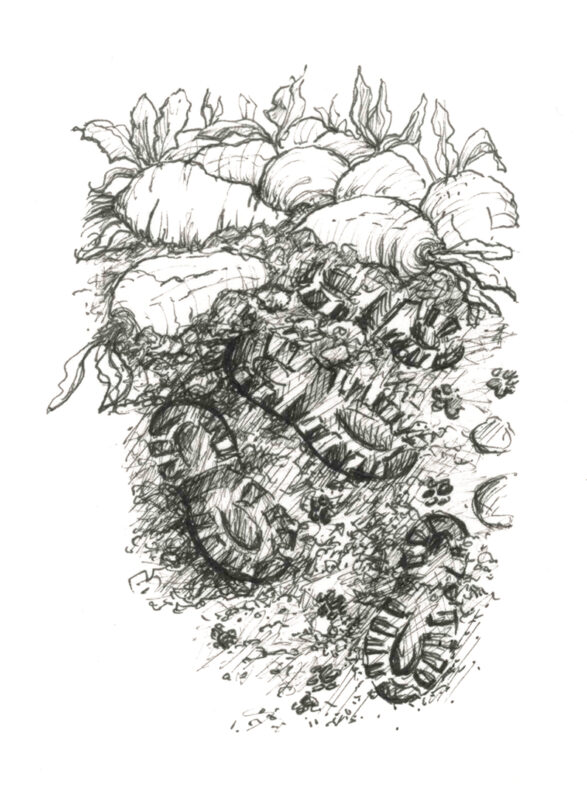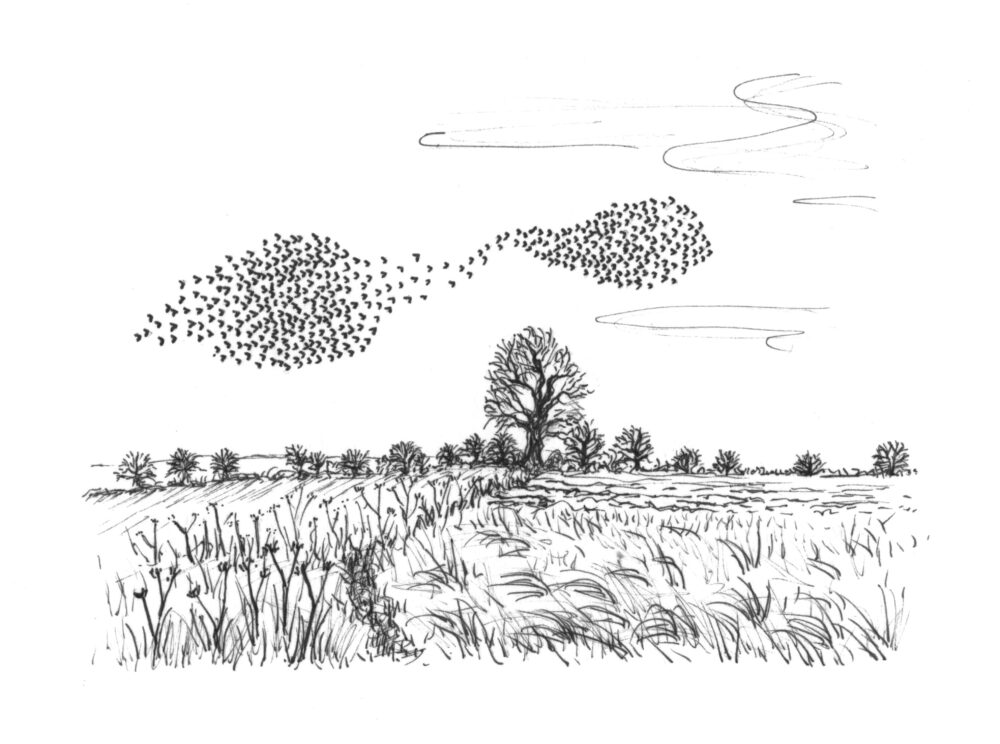This is December; everything proclaims it: that glimmering sun that can hardly climb the sky, the hawthorn hedges all red with berries, running from the red roofs in one village to the red roofs of another. A girl crosses the common wearing a red hat and scarf, and immediately is part of the picture of December. It might be Christmas Day; there is that sort of feeling in the air, a quiet sky, one half crystal clear, patient-looking clouds lying across the other half, and no wind to alter their disposition all morning. The fields are deserted, there is not a sound anywhere; field gateways are like streams of lava, and a wayside farm smears itself over the road; the road is lost for a hundred yards.
I walk through a farmyard between barn and cowshed and cartsheds. In the farmhouse garden (or close or whatever one may call it, for it is just a patch of grass) a flock of turkeys is parading. It must be the fashionable hour, for tails are spread and they stalk slowly, very stiff and starchy, turning decorously this way, that way. Gobble-gobble-gobble – such a conversazione, such a waving of large and expensive fans, such a brave show of red, such groomed and gleaming sequin breasts; at any moment I felt the band would strike up the Military Two-step and they would start revolving with their partners.
*

After yesterday’s downpour even sugar-beet lifting is in abeyance. After a wet November this sugar-beet business just about reaches its climax of wretchedness. Our forefathers might well groan, seeing this winter campaigning on their beloved land. And cows heaving themselves through boggy gateways twice a day, even standing in the cold wet wind among bare trunks of marrow-stem kale, looking disconsolate as Ruth amid the alien corn. ‘What a miserable way to go on,’ the old arable bullock farmers would say, even the old arable cow-keepers, whose idea was to keep cows in winter as warm as they kept themselves. ‘If you notice,’ an old farmer said to me, who disapproved of these modern expedients, ‘if there’s a shelter in a field, come rough weather the cow will go inside it, but come hail, come snow a horse will choose to stand out. That’s their different natures.’
Yes, in December I look back upon the winter work of my old arable farm, before cows as a business ever entered into my ken – it was ploughing with the teams, and hedging, and feeding stock in straw-yards. Said a man to me gazing at the sugar-beet field with cart ruts like rivers, ‘That’s what made me go to sea – sugar-beet lifting in December.’ I suggested that seafaring was no picnic in December either. ‘Oh yes it is, compared to lifting sugar beet,’ he replied.
*
Further on, the road passed through a common where brambles stood like green banks, their leaves still on them. A man wearing an old peaked uniform cap, a ragged coat and gumboot tops as leggings, advanced furtively across the foreground with a gun. A flock of geese with deep keels waddled in front of him; he crept towards the gateway of a field of roots on the edge of the common; a private hare might there be converted into a public hare. That figure, I thought, is eternal. In peacetime we call him poacher, in wartime partisan, maquis, franctireur; according to circumstances he is a patriot or a mild lawbreaker; civilization commends him or puts up with him – the furtive one who stalks game in wild places.
I heard the report of his gun. I was out of sight of him by then. Soon after I heard another sound, the toot of a hunting horn. Woods and hedges black as shreds of night curtained the distance, veils through which a great white horse moved with the suddenness of a vision, and another behind him, fainter because he was grey – and dark horses following. The sterns of hounds were just visible as a motion in a root field. The white horse seemed to float airborne, a shape of mist, until he came to a gap and showed his action. The others too, as they followed him and came to the gap, showed their legs lifting and falling, then behind the hedge again they seemed to float, undulating slightly upon a long wave of darkness. ‘Toot-toot-toot,’ the horn came thin and peremptory, and then the same sort of summons was rendered by the human voice; the horn again and then the voice, the belling music of the hounds started up and died again; started up, swelled into an excitement, the human throat joined in, the horn burst ‘toot-toot’ very urgent, then seemed to choke on itself, but recovered breath and blared. Then horses, hounds, all swept out of view, seeking the same prey with a loud flourish as the man with the gun had sought in crouching silence. The landscape became a solitude again, soundless and quite dark save where the glimmering sky was answered by white tufts of old man’s beard.
*
My byway wound like a serpent between this man’s field and that man’s field; at one point a corner of 45 degrees safeguarded somebody’s immemorial furlong. And then I came to the mill, and the water swirling all around it, spilling over the weir in a white cataract. There was the patch of green where years ago we picnicked, having reassured the children, who were quite small then, that the tumbling waters of the sluice meant no harm to them. We unharnessed the pony and tethered him, and he gazed while we picnicked beside the mill stream. We were on our way to attend a birthday party of another 5-year-old at a friend’s house into Norfolk over the river. What an adventure that journey was; now that there is petrol again it is merely a hiatus between house and house, but then we saw and smelt and heard all sorts of things by the way. This December day ten years later I still remember that journey in the pony-trap, and how the sun shone and the river looked, and how we admired the curious Gothic windows of the mill-house, which I do again today – though it looks like only an office now. Those windows still protest: ‘It was a simple life but you can see – we had the art of it.’
9 December 1950
Extract from Adrian Bell, A Countryman’s Winter Notebook © Archant Community Media Limited 1950–1980
Illustrations © Beth Knight 2021





